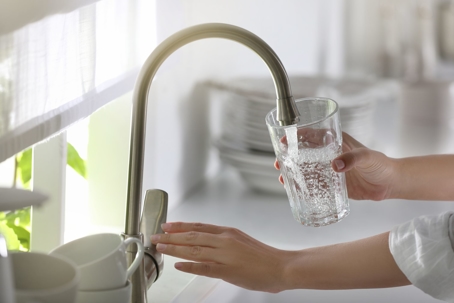If you live in Texas, you may wonder if chlorine is in the water coming out of your faucets. After all, chlorine is often used to disinfect public drinking water. However, using water with chlorine daily can adversely affect your comfort and physical well-being. In this blog post, we'll take a “deeper dive” into chlorine-treated water and explain how to remove chlorine from your home's tap water.
Chlorine has a long history of being used to disinfect water, dating back to the 1800s.
Chlorine has long been used as an effective chemical to disinfect public drinking water, being added directly or through the release of chloramines. This practice can date back as far as the 1800s. But since then, our understanding of chlorine and its potential side effects — such as irritation to the upper respiratory system and eyes — has grown significantly. While chlorine is still utilized today, it is important to weigh both sides when deciding whether or not you'd like this substance in your tap water.
Chlorine is kept at "non-toxic" levels in public drinking water, but continued exposure to chlorinated water may have adverse short- and long-term health effects.
While it is true that public water treatment facilities may keep chlorine at "non-toxic" levels, regular long-term exposure to chlorinated water could still have negative health effects. Some health complications include damage to airways in adults and children, increased risk of colorectal cancer, and other issues like skin irritation or hair loss due to increased sensitivity to chlorine. Studies have also revealed that chlorinated water exposure is positively associated with bladder cancer. However, only further research can determine the extent of these risks, so it is essential to follow up with any new information on this topic.
There are ways to filter chlorine from tap water, including using a home filtration system.
Changing how you consume tap water can be a simple yet effective step in improving your overall health and comfort. Home filtration systems are a great way to protect yourself from chlorine's potentially harmful effects. You can also enjoy additional benefits from more comprehensive water treatment systems (like our favorite, the Halo 5), such as softer water, which will be easier on your skin, laundry, water-using appliances, and plumbing fixtures.
In Conclusion
All in all, it is important to be aware of the potential risks of chlorine and how it could affect one’s overall health. Although chlorine has a long history of being used to disinfect public drinking water, its continued presence at lower levels can still have adverse short- and long-term health effects that can potentially jeopardize one’s well-being. It’s vital to remember that although we may not immediately start to feel the effects of chlorine, further exposure through tap water could present problems down the road.
Find Out What’s In Your Water
At Rescue Air and Plumbing, we offer our customers a complimentary water test that measures the acidity and chlorine levels in their home’s tap water. We have these testing kits on every truck, so if you’d like your technician to run a test for you while they visit, all you have to do is ask!
Looking for reliable water filtration system installation in the Dallas-Forth Worth area? Look no further than Rescue Air and Plumbing: (972) 201-3253.

